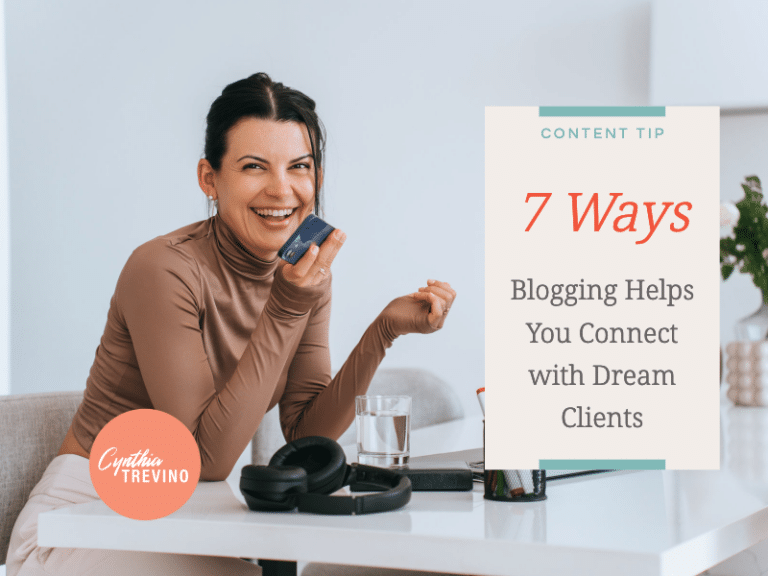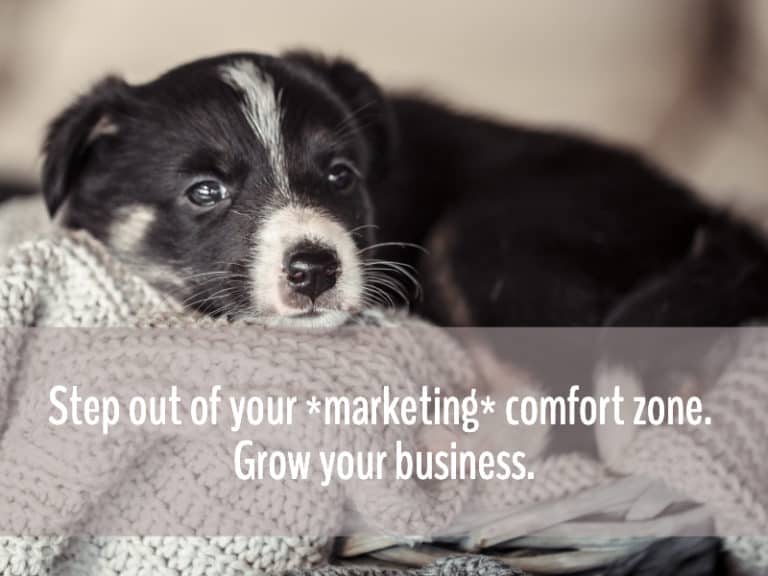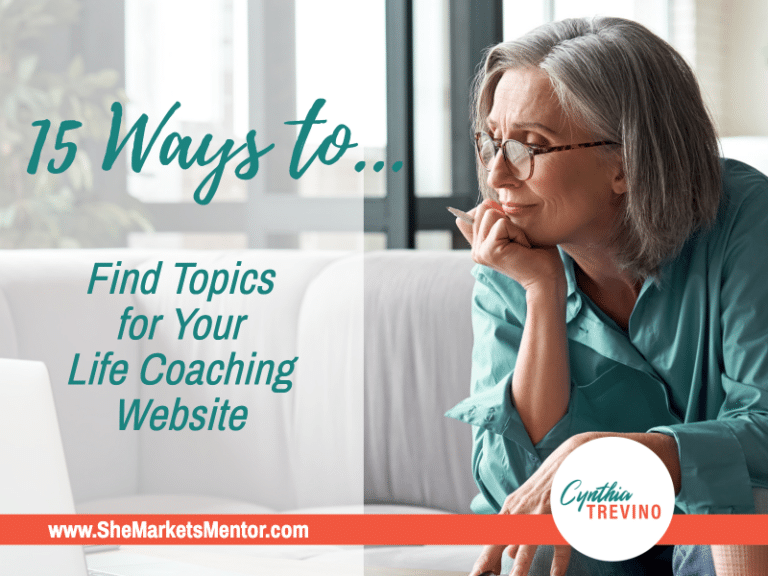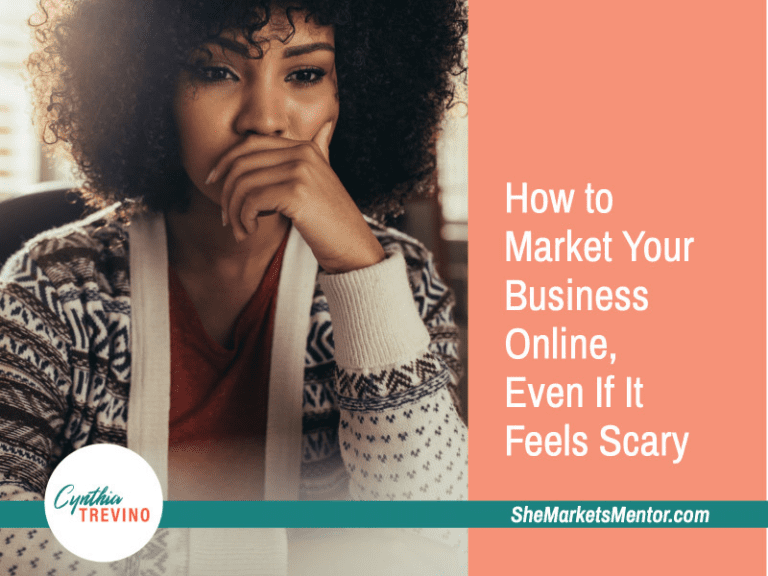Podcast Interview: How to Speak Your Client’s Language
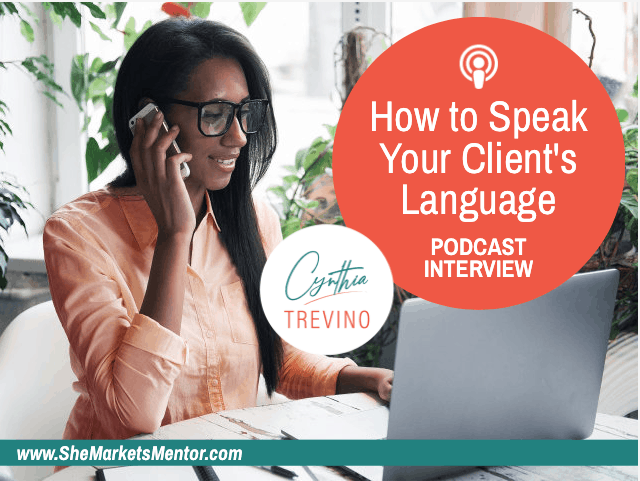
Are you looking to discover more about how to speak your client’s language?
Great, because I was fortunate to be a guest on Don Hutcheson’s popular podcast, Discover Your Talent, Do What You Love. You’ll find useful tips and tactics so you can apply how to speak your client’s language to your messaging and content.

Here’s the transcript of our conversation.
Intro: How to speak your client’s language podcast convo
Don Hutcheson: Hello world. Welcome to Discover Your Talent – Do What You Love, number 768. I’m your host, Don Hutcheson. Every Monday and Wednesday I interview someone from around the world who’s discovered their talents to do work they love to create a life of success, satisfaction, and freedom. On Fridays, I interview a well-known expert from the fields of personal or business development who share experiences, tools, and insights to help our listeners along their journeys.
Cynthia Trevino: So, number one is: marketing is not about you. Marketing is not about your skills, your experience. Marketing’s about the wishes and hopes and dreams of your ideal client.
You’re not selling yourself, you’re not talking about yourself.
You’re talking about what’s possible for your ideal client. So marketing is educating, and just make that shift.
Marketing is not about you. Marketing’s about your future clients.
Don Hutcheson: I’m delighted to bring you our featured expert, Cynthia Trevino. Welcome, Cynthia.
Cynthia: Hi, Don. I’m happy to be here.
Don: Thank you. It is our pleasure. Cynthia Trevino works with purpose driven entrepreneurs who urgently want to speak their ideal client’s language, earn more income, and have more impact. She created the Client Clarity to Cashflow signature program and is the author of the number one best-selling book, She Markets, A Guide For Women Entrepreneurs: Five Simple Steps to Attract More Clients, Make More Money, and Have More Impact. She’s helped companies big and small reach clients, fulfill visions, and make income goals for over 30 years.
Don: Well, Cynthia, you’ve been doing some incredible work. Congratulations on that. Today’s topic is right in your sweet spot: how to speak your client’s language so you can find more clients, have more impact, and make more money. So take the stage for a minute and set up the situation here and let’s dive into the conversation.
Cynthia: Oh, thanks, Don. This is so great. I love having this conversation. So let’s imagine for a moment that all of the women, business owners, and entrepreneurs, speakers, and experts in your audience, let’s imagine that they are perhaps frustrated because they’re not filling their business with the kinds of clients they love working with. So my definition of an ideal client is this. Your ideal client is someone who shows up to do the work. They’re excited to solve their problems. They’re thrilled to use your products and services exactly the way you designed them to be used.
Don: I love that.
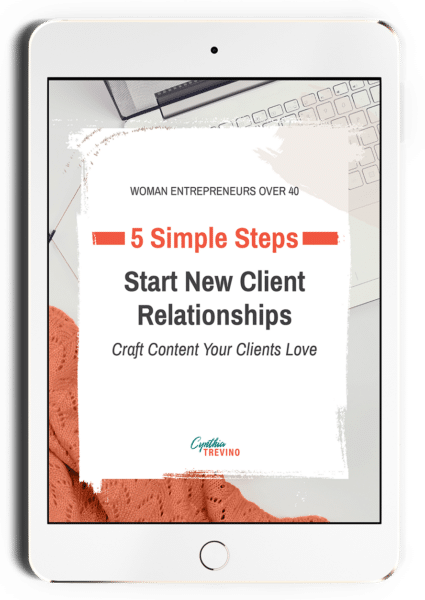
Create Client-Attracting Content
Stop spinning your wheels about the best content to create, so you can bring in clients. Get this guide and follow my simple 5-step Client Clarity System to create content your future dream clients search for.
That way, you can foster meaningful connections and pack your calendar with clients who love your work.
By signing up, you agree to this website’s privacy policy and terms and conditions. We promise we won’t send you spam. You’re welcome to unsubscribe at any time.
Knowing when your dream clients want to solve problems
Cynthia: Yes, because they’re motivated to solve their problem. They’ve made a decision, “I need to solve a problem,” or, “I need to achieve a dream.” And you know what? I tried everything. I’ve tried self-help, I’ve tried free Webinars, I’ve tried books, I’ve tried self-study, and I’ve tried everything. Now I know I need the guidance of an expert. Don’t you love working with those sorts of people, Don?
Don: Oh, yes I do. Absolutely.
Cynthia: And it’s a win-win because the entrepreneur is able to see her work, her products and services get out in the world, improve someone’s business, life, health, finances, whatever it is that they do. So that’s my passion. As you can tell, I get very excited about this.
Don: Good for you.
Cynthia: And yet, once in a while, women entrepreneurs will say to me, “But, Cynthia, if I focus on one ideal client I’ll miss out on business. Oh, my gosh, I won’t attract enough people to grow my business. Oh, what if I miss out on a client? And so I always say to them, think about what you share in common with J.K. Rowling, J.K. Rowling, as we know, is the creator and author of this phenomenally successful Harry Potter series of books, movies, and everything after that. Right, Don?
Don:: Everything after that. Yes.

Cynthia: Are you a fan of J.K. Rowling’s work?
Don: Yes, yes. Especially the movies, and I’m really a fan of the fact that she was one of the first billionaires in history to fall below the billionaire status because she gave away so much money to humanitarian causes. How’s that for wonderful?
Cynthia: That is wonderful. That is absolutely wonderful.
Don: I just read about that in the last couple of months. So she is a great humanitarian as well as a brilliant creative person.
Cynthia: She is. She’s amazing. I love her. If we think back, most of your audience, I think, will know her story, that she started in the UK, in England as a mom on welfare and she had a child and she was a single mom and she was struggling to come up with a way to earn money. She had an idea for that first Harry Potter story.
So if we think about her, she was on a train, I think some of the story says she had to borrow a pencil at first. She was writing the initial story by hand. So in that moment, her first story she was focused on one single reader. The parallel for the women entrepreneurs in your audience is focusing on your single ideal client.
Cynthia: J.K. Rowling was focused on her single ideal reader, and her ideal reader, Don, was a 13-year-old boy. So she created the story always focusing on what would delight, what would enthrall, what would teach, what would fascinate a 13 year old boy. Yet, as we know, her writing resonates across generations, across cultures, every language, to every corner of the world and read by billions. Right, Don?
Don: Right, right. Every age group.
Your passion will come through because
Cynthia: Every age group. The reason that resonates is because she poured her creativity, her passion, what she loves about her work. Much like purpose-driven women entrepreneurs in your audience do. They pour everything they have into their products, their services, their courses, the talks they give, the articles they write, the videos they make. When you pour everything into that one person, all of your passion comes through, because you created your 13-year-old boy as an entrepreneur, right?
Don: Yes, exactly.
Cynthia: So then it will resonate across your market. Because the biggest pushback I get when I work with women entrepreneurs is this fear of missing out. “Oh, no. What if I don’t attract in the right client? What if I miss some clients?” But when you focus on the right client your products and services are going to be so phenomenal because they have so much of ‘you’. You will attract other clients in. So I tell that story to put your fears at rest of those in your audience who think, “Oh, I’m afraid I’ll miss out on business if I spend so much time focusing on one ideal client.”
Don: Yes, it’s the niche. Right? It’s the niche thing.
Cynthia: Yes, yes, yes. And, you know, I think niches are wonderful, Don, but I also ask my clients to do this. If you think about, we all have heard of target market and the niche market, right?
Don: Absolutely, yes.
How your dream client is different from your target market
Cynthia: So if we think of a target market as like a giant beach ball, that’s a lot of people. Let’s say an example of a wellness coach who’s based in Chicago. So she says, okay, she wants to serve a professional women 45 to 55 who are working in Chicago. Well, that’s a big group of women. That’s her target market, right? Then so we say, “Okay, let’s narrow that down.” So then she goes to a niche market. So our wellness coach in Chicago might say, “Okay, my niche market is women in that age group, 45 to 55, working. And they’re stressed and they’re overworked and overwhelmed and overweight.”
Cynthia: Okay, well that’s a little more focused, right? The professional women, right? However, overworked, overwhelmed, and stressed that’s still a pretty big group of people. I say go further to the ‘diamond’ in the center of the small medicine ball.
We have a beach ball then we have a medicine ball. Think about a diamond in the center of your niche market, and the difference between your niche market and your perfect dream client is a woman who is overworked, overwhelmed, living in Chicago. She’s the right age group. The difference is she’s decided she cannot get healthy alone. She’s decided that she’s tried everything. She tried every cleanse, every program, every exercise video, right?
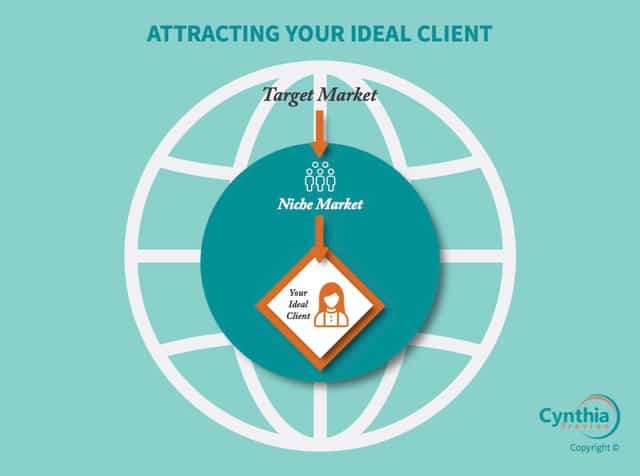
Don: There are only about a bazillion of them out there, right?
Cynthia: Exactly. But she needs an expert. She needs a coach to lead her by the hand so she can get to her goal weight and get your dream fitness level. So the diamond in the center of your target market, your niche market as you get smaller and smaller is … your perfect client is that man or woman who is ready to make a change and knows they need your help. They know they need your products and services and they want to work with you because you get them, you understand their specific challenges. And that’s what I wrote in my book, She Markets, is how to get to that diamond in the center of the niche market.
Don: Perfect. Well, give us the steps. I’ve been in marketing for 45 years and studied all the greats, and I think you’re right on target with what all the greats have been teaching all this time from different perspectives. So share with us your unique perspective on this. I think it’s fascinating.
Cynthia: Oh, thanks, Don. You know, and I’ve been lucky too because I’ve worked with and studied with so many wonderful marketing experts in my career also. The first step is to change the mindset. So many women that I work with are concerned. They say, “Marketing and sales makes me feel hypey. I feel pushy. I feel queasy. Oh, it’s so sleazy to be a self promoting and tooting my own horn.” You probably heard that. Right, Don?
Don: Oh, of course. Of course.
Cynthia: So what I say is just to shift the mindset and remind yourself that:
Cynthia: 1. Marketing’s important because the better job you do if marketing, the easier your sales are, right? Because if you do a good job of marketing, you’re going to pull in the people who are your diamond in the center of your niche market. Those people who are motivated, ready to go, ready to make their dreams come true and work with you. So, number one is marketing is not about you.
Marketing’s not about your skills, your experience. Marketing’s about the wishes and hopes and dreams of your ideal client. So if you think about it, marketing is educating. You’re not selling yourself, you’re not talking about yourself, you’re talking about what’s possible for your ideal client. So marketing is educating and just make that shift. Marketing’s not about you. Marketing’s about your future clients.
Cynthia: Then once they become your clients, you can be the expert. You can talk about your experiences, you can share with them your expertise and all of your insights and knowledge. But in the beginning you talk about what they want to achieve. So step one is just that shift in your marketing mindset. It’s not about you, it’s about them.
Cynthia: 2. Meet your ideal client. It’s get to know your ideal client as well as you know your sister, your brother, your spouse, your kids. You know them like you know your family.
- You know everything about them, right? Their hopes, their dreams, and you go beyond the problem you solve, because you know they have this problem because you’re an expert at solving it, aren’t you?
- But when you get to know them, you know their values, their hopes, their dreams, what’s behind them solving the problem?
- Do they need better systems for their business so they can get to their kid’s soccer games and not be in the office till 10:00 PM every night, right?
- Or do they want to lose weight so they can wear a fabulous dress for their daughter’s wedding or their own wedding?
- Or do they want to get in shape so they can keep up with their grandkids or they have a dream of hiking Mount Shasta.
Cynthia: So, whatever their dreams are they want to solve a problem. That’s true and you know that and that’s good, but to place yourself above and standout above others in your field is to know your ideal clients’ hopes, dreams, and the big why behind why they want to solve their problem. So that’s number two, getting to know your ideal client better than anybody else in your space knows them.
Don: What are the tactics to do that?
Cynthia: You know, I believe a lot in journaling and I tell my clients to do two things that sound a little … they sound very simple, but they help a lot. One is to give your ideal client a name, you’ll probably have more than one ideal client, but start with one. So give them a name. It can be a name of a past client, a name you love, like I sometimes tell them to match the name to their service.
Cynthia: Like, maybe if you’re in mortgage, your first ideal client is Home Loan Harry. Or if you’re a fitness coach, a wellness coach, your client might be Marathon Mary cause you’re helping her get ready to run in a big race. So give your ideal client a name and then pull a picture from anywhere. You’re not going to use this photo, you’re just going to pull it down. Then that way you have a name and you have a photo and when you’re doing any work for your ideal client, you can focus on the one and you can speak directly to them. You pick a name and you pull down a photo and you find a binder.
Cynthia: Or if you’re a non-paper person, use Google docs, open up a folder in a file and then you begin to get down everything you know about Home Loan Harry for your Marathon Mary or your Keynote Kelly, if you’re a speech coach, right? Whoever your person is. You get to know them and you get everything out of your head.
Cynthia: You start with demographics. Clearly, demographics are provable facts, right? We’ve all heard about these. It’s women between 45 and 55 who live in Chicago. That’s a demographic. You want to start there but you want to go so much further. You want to dig deep and you want to get down hopes, dreams, values, what are they sick of? What are they ready for? So you go through this process of getting everything down on paper that you know about your ideal client.
Cynthia: You know, Don, this (ideal client description) is a resource that you use when you’re creating marketing content, before you give a talk, before you work on your products and services, before you go to a networking event, because you remind yourself, “Okay, this is what my Keynote Kelly is dealing with. This is what she’s up against. This is everything she’s up against.” Because you want to understand her world beyond the problems and services you provide for her. Don’t you? You want to know her as a multidimensional person. So that’s step two, meet your ideal client.
Cynthia: Step 3. Really getting a handle on his or her pain points. This is all the pain points. It’s the basic pain points that you know all clients who need your products and services have, all people, but then you go even further to what’s their individual struggle?
- What have they already tried?
- How much do they know before they get to you?
So you know all of their pain points, because your ideal client may have tried to specific sort of approach that didn’t work for them. Everyone’s different, but as you get to know your ideal client you’ll know the characteristics of his or her pain points that set them apart from everybody else in the niche market. So, step three, understanding their pain points.
Cynthia: Step 4. I teach my clients how to speak their client’s language, and I go through a process.
Cynthia: By the way, I have all of these steps outlined in my book. She Markets, A Guide For Women Entrepreneurs, and it’s really all there. I put everything in the book. So yes, I go through the steps to pull out … once you have your binder or your Google doc or your Mole Skin, your journal, wherever you’re capturing everything about your ideal dream client, you go back and you work through how they phrase everything, how they talk about their problems, how they talk about their hopes and dreams.
Cynthia: Step 5. Then the last step I teach is really … it sounds very mundane, but as a marketer it’s really a content plan, but it’s a way to organize everything you want to talk about, because once you’ve gone through all of the work and you’ve gotten everything out of your heart and your head and your gut that you know about your ideal clients and you base this, Don, on your past success stories, right?
If somebody’s stuck, they go, “Oh, I don’t know anything about my ideal client.” Because if you think about it, the ideal client’s really a fictionalized person, right?
For J.K. Rowling, her 13-year-old boy was a composite of 13-year-old boys she knew.
For your audience as an entrepreneur, your ideal dream, perfect client is a composite, a fictionalized story, if you will, a description of everyone you’ve known that’s been successful (with your work) and everyone you’ve helped, and you put them together into one person.
Don: Right. Well, give us some examples of … share some victories or some vignettes of people you’ve helped figure out their niche and how to approach the niche and how to serve the niche.
Cynthia: Yes, Emma is a client that I talk about in my book also. Emma was a very successful executive recruiter and she did a lot and she had really great referral sources. She’d been in business for almost 20 years and she had a great referral network and she talked to all her referral partners and she really didn’t have to do any marketing because her referral network was so strong, which is a great thing in business, right?
Cynthia: We all have those times. But then things shifted. Her referral sources left the area or they changed careers and she … all of a sudden her referral sources were gone. Her flow of ideal clients and clients coming in was drying up. She had always avoided marketing because she didn’t want to feel pushy or salesy or hypey. So she had just not paid any attention to marketing virtually her whole time being a self-employed, you know, being a woman entrepreneur.
Cynthia: She came to one of my talks in San Diego, and then we talked, and she signed up for my program. She, as we took apart the steps and she understood that marketing is educating, and she didn’t have to feel self-promotional, then she came up with great titles.
One of the things my clients love best about the work I do with them is they have a whole library of titles that they can test for email subject lines, for videos, for blogs, for social media posts. So she had a focus of what to create content about on a weekly basis. She started blogging regularly and she began to pull in clients on a regular basis. She ended up doing three different ideal clients. Her schedule is, you know, the first week of the month she writes (blogs) for one, the second week of the month for the second one, and she rotates through.
Cynthia: That was great, because she’s so accomplished and she did great work. However, she (Emma) had all of her eggs in one basket with the referrals and not doing any proactive educational marketing. So she was really happy and she had a steady stream of clients after that and she didn’t have to be frustrated anymore. So that was a really fun project.
Don: Beautiful. Well, tell us more.
Cynthia: Let’s see. Another person I worked with was also a woman entrepreneur and she had this social mission. She created a wonderful product, and this is a few years ago before ecommerce was super big. She sourced Argan oil for the product from Morocco where the women of the village were the economic engine for this developing economy. And the product was flying off the shelves in spas and shops, but her website sales were going nowhere. So she brought me in to help her come up with how could she attract more clients to her ecommerce website. So I sat down with her and her salesperson and I said to them, “Okay, tell me about your perfect buyer, your perfect client.”
Cynthia: They both said together … it was funny. I don’t think they practiced it, “Women between the ages of 18 and 81.”
Don: Oh, my goodness gracious. 18 and 81, wow.
Cynthia: So I said, “Okay, you just described your buyers. Now, let’s talk about the PERFECT buyer.” So we narrowed … because when you read their blogs on their website and they were trying to talk to everyone, so when you go across that many generations, Don, right? They have different priorities, right?
Don: Right.
Cynthia: So we narrowed down (to), professional women between 45 and 55 who love luxury products, who were comfortable shopping online and who resonated with Anna’s message of ‘women helping women’, because a portion of all the sales went back to the village (in) Morocco. So it was great because they were also the ones that said, “Oh, we don’t want to miss out on any potential buyers from our website,”
So once they started focusing (on) their blogs, their website sales started going in the right direction, because she did need website sales. Even though the product was doing well in retail, she needed website sales to complete her business plan. That that was a fun project as well.
Don: This has been fascinating. All your expertise and experience and insights have served you very well over these years. I understand why you’re doing so well, your book is doing so well. Just give us a sort of a brief summary of the principles that have been guiding you that you use for your clients and have written about in your book, She Markets, just a pithy overview so our listeners can walk away with those or drive away with those.
Cynthia: Well, I believe that when you’re in business you’re in business to serve. And yes, you’re taking care of yourself, your family, having time so you can do your own travel, or contribute to causes that you want to contribute to. Yet, when you’re purpose driven you make sure that everything you do is about service. So when you’re creating products and services, when you’re creating any content, you start with your 13-year-old boy who is your person, what’s going to serve them the best.
Cynthia: So you keep in mind being of service at whatever you’re doing in your business. When you’re networking, when you’re creating content, when you’re putting together products and services, when you’re working with referral partners, you do everything you can to be of service first. And that leads into giving first. You know, that’s why I believe in having a blog and having a marketing program that’s really about education. So I urge all of my clients to … whether they’re comfortable doing videos or blogs, whatever sort of media you’re comfortable creating in order to stand out in the tsunami of social media that we all find ourselves facing every moment of every day.
Cynthia: Don’t worry about how much is out there. Just worry about speaking to your 13- year-old boy so that you’re very focused and always keep that in mind. Sometimes someone will come to you and if they’re not your ideal client, you make a decision. Cause I always say, “You’re the boss.” You know, it’s your business, you’re the business owner and so someone comes to you, they don’t fit one of your two or three perfect, ideal clients but you have the time, you have the bandwidth to serve them, then by all means serve them because you’re the boss.
Cynthia: It’s with your ongoing work, with everything you’re putting … ‘Cause your time. Remember, you’re doing marketing, and marketing is important so that once you have enrollment conversations with potential clients you can see if there’s a fit. And the more marketing you do, and the more focused your marketing is on your ideal, perfect dream client you’re going to find the people that resonate with your message. Because you’re going to be speaking their language once you get to know them.
Don: Exactly right.
Cynthia: So I also tell my clients, ’cause this foundational work of putting together your ideal dream client, “Oh, it’s work,” or, “I have to think about this.” And I say, “You know, once you know your ideal client better than anybody else in your field, you make better decisions about everything else in your business.”
Don: Absolutely. Unquestionably.
Cynthia: Yes. You’ll know. You’ll have a better idea of where to find them. You’ll have a better idea of how to qualify them, because when you first meet a potential client, you’re really both sorting, right? ‘Cause marketing and networking is sorting, right? ‘Cause (to see if) we fit each other. Right?
Don: Right, right, right. Beautiful. Well, Cynthia Trevino, what a delight having you on the show today and sharing your wisdom and expertise in this vital topic of how to speak your client’s languages, how to niche yourself so that you can serve the people that you can benefit the most. How do our listeners get in touch with you to learn more? How do they get your book?
Cynthia: My book is on Amazon, so it’s Cynthia Trevino and it’s She Markets, A Guide For Women Entrepreneurs, on Amazon. Also, I’m happy to connect with anyone in your audience on LinkedIn. I’m Cynthia Trevino on LinkedIn. (On) my website and my blog, I share a lot of lessons, my website is Shemarketsmentor.com, And you’ll probably have the links in the show notes. Right, Don?
Don: Of course.
Cynthia: So if it’s Sharmarketsmentor.com/blog. I post a lot of content there. On Instagram … I recently started my Instagram.
Don: Great.
Cynthia: Yeah, so I’m new to Instagram but I am posting there. On Instagram I am Cynthia Mentor, on Instagram. On Facebook I’m Cynthia Trevino Mentor, on Facebook. So whichever … I would love to connect with your audience on whichever one of their platforms they would … whichever’s their favorite social media tsunami to dive into every day.
Don: Oh, I love that, I love that. That’s perfect. Listeners know you can go to discoveryourtalentpodcast.com click on podcast in the navigation bar. There you’ll find the show notes of this fine interview.
Don: In closing, every one of us is born with unique talents and gifts. We don’t learn them, we can’t ignore them. They’re just a part of who we are, our DNA. Whenever we discover them and use them in our and careers, we do not merely survive. We thrive in every way possible. So until next time, all my best, and whatever you do have fun out there today.
~ ~ ~
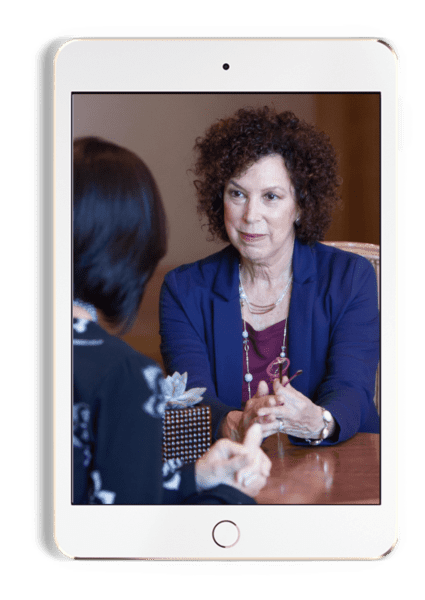
What if you could finally create content consistently?
If creating your marketing content has felt like a chore, a time-suck, or a massive mystery, you may have given up on content entirely.
But the truth is:
Content is key to attracting ideal clients and filling your programs. So don’t give up!
If your content ideas are buried in your beautiful brain, you want a process to help your words flow.
You want specific actions to implement so that the content you create stands out to your dream clients.
When you schedule a free Clarity Call, together, we’ll uncover your personalized marketing content actions. That way you can impact more clients. Click below to set up your FREE Clarity Call.

